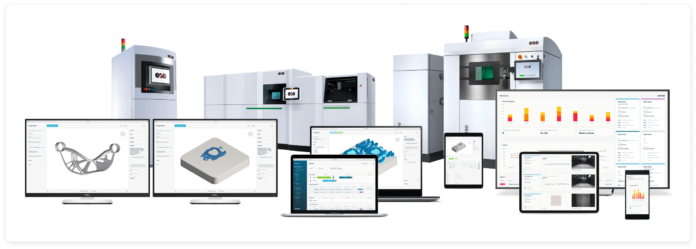The story between EOS and Oqton started last year when EOS decided to conduct an intensive investigation into available systems to support its own internal production capabilities.
If you don’t know Oqton yet, well you should. This global SaaS company has been developing an agnostic cloud-based manufacturing operating system for several years now, which automates the end-to-end workflow across & beyond the production floor.
EOS wanted to increase efficiency and productivity across multiple geographical locations to use the internal available production capacity in the best possible way.
By working with EOS, Oqton has enabled to meet the industrial 3D printing company’s goals in terms of connection, tracking, optimization, and automation of manufacturing operations. By integrating Oqton as key platform for AM production efficiency, both EOS production facilities and its clients will benefit from enhanced production efficiency.
“We all know that there are still issues challenges to resolve when it comes to AM facilitating production at scale. Oqton was founded to resolve these core issues and we are now able to demonstrate that effectively and consistently, as the results at EOS show”, Oqton’s CEO, Ben Schrauwen comments.
From a technological standpoint, let’s note that EOS has integrated Oqton across 8 of its global production facilities, with over 100 3D printers as well as ancillary equipment including post-processing, now connected and coordinated by a single operating platform. Oqton explains in a press communication that its MES and IIoT capabilities provide EOS with the security and power to manage all of its resources and machines.
According to Trevor Kirsten, Head of Digital Manufacture at EOS, Oqton’s ability to integrate all of their factory equipment (the industrial 3D printers, periphery equipment, and post processing) has enhanced their planning and efficiency both with the machines and personnel.
“And because Oqton provides good machine connectivity we can monitor machine states in real time and send print files from the MES directly to the 3D printer. In addition, the low code approach of Oqton allows us to easily tailor workflows and dashboards, the platform is interoperable with other software systems, which is also very beneficial for us. Oqton has proven itself to be very customer-focused and agile by functionality and creates new features very quickly in response to EOS inputs”, he adds.
Oqton has recently been a main contributor in the software segment of our July/August edition of 3D ADEPT Mag. Read more on Schrauwen’s key insights into “Software Automation In Additive Manufacturing: Where Are You?”.
Remember, you can post job opportunities in the AM Industry on 3D ADEPT Media free of charge or look for a job via our job board. Make sure to follow us on our social networks and subscribe to our weekly newsletter : Facebook, Twitter, LinkedIn & Instagram ! If you want to be featured in the next issue of our digital magazine or if you hear a story that needs to be heard, make sure to send it to contact@3dadept.com






